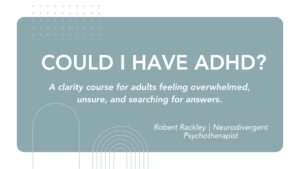Why So Many Adults Miss the Signs of ADHD
By Robert Rackley MSc MIACP | The Neurodivergent Psychotherapist
Every week in therapy, I meet adults who begin by saying, “I can’t believe I missed it.”
They’re talking about ADHD — often discovered only after decades of living with exhaustion, self-criticism, or quiet confusion about why life always felt harder than it should.
Missing the signs of ADHD isn’t uncommon. In fact, it’s one of the most consistent stories I hear from late-diagnosed clients.
Let’s explore why.
1. ADHD Doesn’t Always Look Like Hyperactivity
For many adults, ADHD doesn’t appear as the stereotype of a restless child who can’t sit still.
It can look like:
Constant mental noise and overthinking
Emotional intensity and sensory overload
Forgetting tasks despite caring deeply about them
Perfectionism, burnout, or chronic self-blame
When ADHD shows up this way, it’s easy to dismiss it as anxiety, stress, or simply “being busy.”
2. Masking Can Hide the Struggle
Many adults — especially women and those raised to “hold it together” — learn to mask early on.
They overcompensate by being the reliable one, the high-achiever, or the person who never says no.
Externally, they seem capable.
Internally, they’re exhausted.
Masking creates the illusion of coping while eroding mental health. It’s one of the main reasons ADHD remains unseen until burnout forces a pause.
3. Outdated Diagnostic Models
The diagnostic criteria for ADHD are still largely based on how it appears in young boys.
That means traits like emotional dysregulation, time blindness, or sensory overwhelm — which are core to many adults’ experience — don’t always “count.”
As a result, countless people slip through the cracks because they don’t fit the traditional picture.
4. Success Can Be Misleading
Achievement doesn’t cancel out ADHD.
Many adults thrive professionally or academically by relying on adrenaline, overwork, or hyperfocus.
But sustaining success through stress takes a toll.
In therapy, I often see clients who appear “high-functioning” but are quietly burned out, describing life as “running on fumes.”
Their coping strategies masked their ADHD — until they couldn’t anymore.
5. The Role of Self-Blame
Perhaps the biggest reason ADHD goes unnoticed is shame.
If you’ve been told for years that you’re careless, lazy, or unreliable, it becomes easier to internalise those labels than to question them.
Recognising ADHD later in life often brings enormous relief — and grief — as people realise it was never about character, but wiring.
Moving from Confusion to Clarity
If you’ve spent years wondering why you struggle to focus, stay organised, or regulate emotions, it’s worth asking:
Could this be ADHD?
Getting clarity doesn’t mean chasing a label. It means finding language and understanding — tools to rebuild self-confidence and reduce shame.
That’s exactly why I created my short clarity course, Could I Have ADHD?
It’s a gentle, practical starting point for adults who want to explore ADHD without overwhelm or judgment.
You don’t have to have all the answers — just curiosity.

